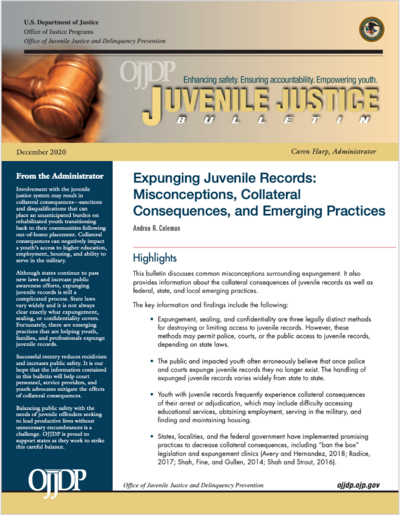Expunging Juvenile Records: Misconceptions, Collateral Consequences, and Emerging Practices
Brief
Clean Slate
Topics:
Collateral Consequences
Criminal and Juvenile Records
Records Clearance, Expungement, and Sealing
Youth/Young Adults
Reentry population:
Youth/Young Adults
Date:
Source:
Office of Juvenile Justice and Delinquency Prevention
Expunging Juvenile Records: Misconceptions, Collateral Consequences, and Emerging Practices
This bulletin discusses common misconceptions surrounding expungement. It also provides information about the collateral consequences of juvenile records as well as federal, state, and local emerging practices.
The key information and findings include:
- Expungement, sealing, and confidentiality are three legally distinct methods for destroying or limiting access to juvenile records. However, these methods may permit police, courts, or the public access to juvenile records, depending on state laws.
- The public and impacted youth often erroneously believe that once police and courts expunge juvenile records they no longer exist. The handling of expunged juvenile records varies widely from state to state.
- Youth with juvenile records frequently experience collateral consequences of their arrest or adjudication, which may include difficulty accessing educational services, obtaining employment, serving in the military, and finding and maintaining housing.
- States, localities, and the federal government have implemented promising practices to decrease collateral consequences, including “ban the box” legislation and expungement clinics




